The Tutor
David G. Golden '80, J.D. '83, recalls wallowing in a "sophomore slump" after an academically indifferent fall term. "Larry clearly sensed this," he remembers, "and sat me down for about three hours after dinner" one January evening. "Larry" was Lawrence H. Summers, the graduate student who led Golden's Economics 10 section during his freshman year, and then became the resident economics tutor in Lowell House.
What happened during those three hours, Golden now recounts, was "exhortation and inspiration--'You should be doing this and trying that,'" mixed with a bit of "insulting" to shake Golden out of feeling sorry for himself. "Larry had a strong interest in my course selection, pointing me to philosophy and music and even a graduate-level econometrics class. He wanted me to have a wonderful experience at Harvard.... He cared passionately about taking advantage of everything Harvard had to offer." Nearly a quarter-century later, Golden ranks his classroom and advising relationship with Summers as "the most important interaction I had" in the College--even though, as a government concentrator, he wasn't majoring in economics.
A year later, Golden began research that became his senior thesis on the "political business cycle"--how politicians might modify economic policy for electoral advantage. At the same time, James M. Poterba '80, an Adams House economics concentrator, was refining his junior tutorial paper on the same problem. In his sophomore year, Poterba says, Summers invited him to "team up with some graduate students or faculty and get some research experience, instead of just taking courses," and so he became an assistant to professor of economics Martin S. Feldstein '61, Summers, and fellow graduate student Kim B. Clark '74. "This was an absolutely spectacular experience for me," Poterba says. When he worked on his junior tutorial research, "Larry said, 'You shouldn't be writing a term paper just for a course, you should be writing a paper for publication,'" and so teamed him with Golden. The result of that collaboration--what Poterba calls "Larry pushing us to set our sights higher"--was accepted during their senior year for publication in the November 1980 election issue of the American Journal of Political Science. Says Golden (who is now co-director of global technology investment banking at J.P. Morgan H&Q in San Francisco), "It was an incredible treat for us as undergraduates."
Those experiences were characteristic of Summers-student interactions. Arnold professor of science William H. Bossert '59, Ph.D. '63, Jf '66, who became master of Lowell House in 1975 and invited Summers to become the economics tutor, remembers "someone who was really smart but also quick and busy. He was never a person to sit around casually chitchatting. He wasn't out with the bowling crowd." For "someone who wanted to learn," Bossert says, Summers was "a great teacher...someone with whom you could have an intense intellectual experience."
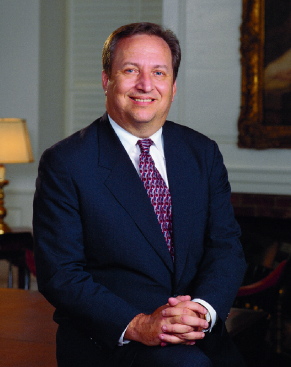 |
| Lawrence H. Summers in the Perkins Room, Massachusetts Hall, March 20 |
| Photograph by Jim Harrison |
The Student
It seems almost genetically predetermined that Lawrence Summers would have an aptitude and an appetite for economics and the academy. Born November 30, 1954, in New Haven, he grew up in the Philadelphia suburbs and attended the Lower Merion public schools. His father, Robert Summers, now emeritus, had a long career as an economics professor at the University of Pennsylvania. His mother, Anita (Arrow) Summers, now emerita, worked as an industrial economist, taught at Swarthmore, and also joined the Penn faculty as professor of public policy and management at the Wharton School of Business. Paternal and maternal uncles include, respectively, Paul Samuelson and Kenneth Arrow, Nobel laureates in economic science.
Neither of Summers's younger siblings pursued an academic career (Richard is a psychiatrist and John a lawyer, both in Philadelphia), but in a late-March conversation in his office at the Brookings Institution, he described a cerebral domestic atmosphere: "I was an intellectually curious kid in an intellectually curious home." Beyond his passion for working out mathematics puzzles, "I was always interested in understanding the world and always arguing about what policies or what approaches to problems would be best." In a 1985 Boston Globe profile, Summers recounted a system of weekly bidding, based on an allotment of chips, by which his father got family members to "express the intensity of preferences" for which television shows to watch.
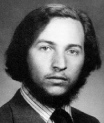 |
| Summers as an MIT student in 1975, his senior year |
| MIT News Office |
Two experiences in particular appear to have sharpened that awakening. First, having been a high-school debater, Summers threw himself into the activity at MIT, ascending to the top ranks of the collegiate circuit. "I put a lot of energy into the debate team," he says, "and was left with some amount of arcane knowledge of policy topics ranging from gun control to civil liberties--but also with a capacity to speak spontaneously in a relatively organized way that has served me in good stead."
Second, as a sophomore, "I worked as a research assistant to Marty Feldstein. The way running regressions and doing statistical procedures could illuminate questions like Social Security or the business cycle had a great impact on me." Beyond providing the model for his own relationship with research assistants, Summers cites the tie to Feldstein, who later served as a dissertation adviser, as one of two "main experiences in shaping my professional identity."
Kim Clark, who completed his doctorate in 1978, four years earlier than Summers, and now is dean of Harvard Business School, says, "It's really important to understand that his principal mentor in graduate school was Marty Feldstein. He got from Marty this kind of warrior mentality about empirical data and important questions."
That "warrior mentality" and focus on important questions came together for Clark and Summers in 1976, when they researched unemployment at the National Bureau of Economic Research. The project illuminates several aspects of Summers's work habits and approach to intellectual problems.
At the time, Clark explains, prevailing opinion held that unemployment for most workers was a temporary and even functional attribute of a labor market, as they shifted from school to the workforce or from job to job, seeking opportunities--"a socially useful, productive spare tire for the economy," and therefore not a policy problem. Among the proponents of this view was Feldstein. "But Larry had this stunningly important insight," Clark says, "to ask the question, 'How much of the total unemployment is actually accounted for by the short-duration spells?'" Reams of data revealed what the averages concealed: a small but significant number of unemployed people suffered long spells of joblessness--a problem perhaps meriting a public response.
Analyzing the data required access to mainframe computers and students who would run the problems. "During those years," Clark says, "Larry was able to attract the most amazing research assistants. He had this knack, because he was not much older than the undergraduates, for hanging around the computer center and finding those guys." James Poterba was one. Another was Daniel E. Smith '80, a Lowell House classmate and roommate of David Golden, who was then "pursuing my interest in computer science under Larry's tutelage" (and who now runs a Miami-based software company).
The research group made an odd around-the-clock relay team. Clark often came to the office in time to "get the handoff" from Summers or a research assistant at 6:30 in the morning. Summers "was just getting going at 9 or 10 in the evening," Clark says. "And he cranks, and he has formidable energy--he just goes."
Smith characterizes Clark as the "methodical" member of the team, and Summers as an "indefatigable frenzy of energy." He recalls leaving Summers a stack of printouts at midnight, and returning the next morning to find a 25-page draft working paper ready for typing. When this nonstop research schedule consumed his study time, Smith says, Summers would tutor him the day before an exam to make up for it: "If you were lucky enough to be in Larry's group, he took responsibility for all of your life. He was always there as a friend. Some of Larry's best work was done at Harvard House of Pizza at 11 o'clock with a slice and a Coke."
As he worked on his doctoral research, Summers assembled more than one such research team. "It became evident, first, that he had an extremely high energy level," says Benjamin M. Friedman '66, Jf '71, Ph.D. '71, now Maier professor of political economy, who supervised the dissertation along with Feldstein. "Second, he had the ability to keep many balls in the air at once. From the outset Larry functioned, at the least, at the level of a highly motivated nontenured faculty member, if not at the level of several tenured faculty members," pursuing "six projects at once."
Thus, even as he and Clark probed the labor market, Summers worked on "An Asset-Price Approach to the Analysis of Capital Income Taxation," a dissertation that Friedman describes as simultaneously empirical, theoretically oriented, and applied. Dense with equations and regressions, it models "the effects of capital income taxation on investment and the market valuation of existing capital goods." But as the next paragraph of the abstract makes clear, its author was after something else, too: "Beyond its scientific interest," Summers wrote, the analysis of capital income taxation "is highly pertinent in light of recent economic events"--the inflation and slow growth of the 1970s. Summers drove beyond elegant formulas toward conclusions about the real-world effects of tax law on business spending for equipment, and the fairness and efficacy of proposed reforms--a powerful lens for assessing America's economic performance then, and the sweeping changes in economic policy during the 1980s.
Friedman says Summers could have completed his dissertation well before he did, but he had already begun teaching economics at MIT. In 1982, the Ph.D. awarded, Harvard offered him a professorship at the age of 28--at the time, the youngest person offered tenure in the University's modern history.
The Professor
Before taking up his teaching duties, Summers accepted Feldstein's offer to join the staff of President Reagan's Council of Economic Advisers (CEA) for a year. There, he worked especially on tax policy and the nation's capital budget. Seeing how the political process worked, Summers says, caused him to "recognize that things were a lot more complicated in practice than they were in my courses. That was a useful education for a young economist."
Back in Cambridge for the fall 1983 academic term, Summers began a professorial career that focused on teaching graduate-level public-finance and macroeconomic seminars. He launched what became a broad research agenda on tax policy, finance and speculative markets, the business cycle, and labor issues such as the determination of wages and employment levels.
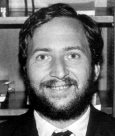 |
| Portrait of the economist as a young professor |
| Crimson File Photograph |
For a perspective on his work at that time, Summers refers a visitor to the 1985 Globe profile. It portrays a young prodigy, fluent in mathematical technique, successfully assaulting the arid, self-referential economics of the day, which valued sophisticated modeling and mathematical precision over any worldly applications. It also suggests a brash willingness to wage intellectual combat not only about ideas, but with their proponents. Harking back to his debate training, Summers is described by scholarly colleagues as "daring and innovative" in style, and as expert "at going for other people's jugulars and defending his own."
However that style might have struck outsiders, within the Harvard economics fraternity the wounds appear to have been superficial at worst. Jerry R. Green, Wells professor of political economy, who has known Summers for 25 years and chaired the department from 1984 to 1987, says Summers "was able to attract the best graduate students in our department and at the National Bureau and MIT--scores of them." Friedman recalls Summers as "very persuasive in appointments matters," and says, "Larry's success rate in persuading a large department to go forward with ideas he was for was remarkably high." N. Gregory Mankiw--he of the "jugular" comment, now professor of economics--began graduate study at MIT in 1980 when Summers was an assistant professor there; joined him at the CEA; and then was recruited to the Harvard faculty by Summers in 1985. Today, he describes Summers as "a very charismatic person, in an intellectual way," filled with ideas and "so excited about economics that he pulled people in."
So great was the attraction, recalls David M. Cutler '87, "There were days when you had to wait four hours to see him because he was in such demand. You'd have an appointment at 2:30 and it would be 6:30 and you'd be frustrated because there was still a line of seven people. But it was all worth it, because it was such incredibly productive time." Cutler was an undergraduate research assistant for Summers, who in turn served as an adviser during Cutler's own Ph.D. study at MIT. They worked together on economic issues during the 1988 presidential campaign of Michael S. Dukakis, LL.B. '60, and conferred in 1993, when Cutler was part of the Clinton administration's healthcare policy team and Summers ran inter- national affairs at Treasury.
Cutler--among the most mild-mannered members of Harvard's economics faculty today--straightforwardly describes the characteristic form of their exchanges then: "I'd go to him periodically and say, 'Larry, I've been thinking about this.' And he'd say, 'That's really stupid.' Then he'd say, 'But there's this aspect of what you say that's interesting,' and he'd go on for five minutes and it was brilliant."
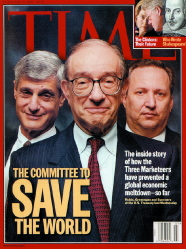 |
| Timepix/Time Inc. |
Today, says Cutler, Summers "really believes in listening. He's not a shy listener. It's not a passive listening style, like going to confession," because Summers is eager to engage in a subject and avid to pursue it to come to full understanding. "The brash stuff," Cutler says, "was all just growing pains. Some people are insecure. That's not Larry. He just needed to be schooled in manners, and he's done that."
Of the 1988 campaign, Summers says, "It whetted my interest in the application of economic ideas to policy" and it furthered his education about the "political complexities" of policymaking. Cutler remembers him dispelling "all sorts of hot air" emanating from both parties about painless ways to reduce budget deficits by cutting "waste." Summers focused on the serious choices looming if deficits were to be cured--but he also, novelly, projected the "good news" if economic growth exceeded projections. "All the things that came to pass in the 1990s, he was talking about in the 1980s, when no one else expected them," Cutler says.
Thinking back on that early professorial period, Summers says with passion and pleasure, "Those first few years at Harvard were probably the most productive period I had so far in research. It was a very exciting intellectual environment--a time of reorienting the cutting edge of economics away from pure theory toward empirical evaluation of ideas..., rather than simply trying to use elaborate statistical techniques on inappropriate data." Moreover, he says, "I was privileged to work with a remarkable group of people," in the academy then, and later in Washington.
For despite his warm memories of scholarly life, the multitasking Summers had already begun to pursue a second direction. Mementos from a different realm entirely decorate his Brookings Institution office: the February 15, 1999, Time magazine cover that showed Federal Reserve chairman Alan Greenspan, LL.D. '99, U.S. Secretary of the Treasury Robert E. Rubin '60, and deputy secretary Summers as "The Committee to Save the World"; the tally sheet from the Senate's 97-2 vote confirming him as treasury secretary that July; a framed set of new paper currency bearing his signature; inscribed photographs from President Bill Clinton and Vice President Al Gore '69, LL.D. '94. By 1991, the ideas Summers had nourished had led him out of higher education.
The Public Servant
When Barber Conable, president of the World Bank, invited Summers in mid 1990 to become vice president and chief economist, Summers says he accepted because "I was attracted by the opportunity to work on development questions, because I thought the scope for making a difference in countries where billions of people were poor was probably larger than the scope in industrial countries--economic forces operated more purely in poorer environments with fewer institutions--and because I was attracted to the opportunity to lead the research of a large group of economists." New issues were at stake--"questions I hadn't had much opportunity to work on"--so he plunged in, joining the bank in 1991 and overseeing reports on the importance of girls' education in developing nations, the role of immunizations in securing health, and the effects of aging populations on the developing world.
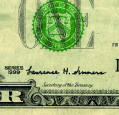 |
| U.S. Treasury |
| As Secretary of the Treasury, Summers signed the currency. Here, he selects the signature, starts the press, and unveils the new designs with Treasurer Mary Ellen Withrow, November 1999. |
 |
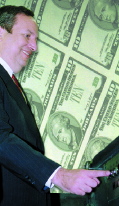 |
 |
Having signed up for a tour of duty in Washington, Summers says, "I found the opportunity to be a leader, and to extend one's influence by being a leader, one of the very satisfying aspects of my experience at the bank." Moreover, international policy questions piqued his interest. What was initially planned as a temporary hitch was extended indefinitely in 1993, when he was appointed under secretary of the treasury for international affairs. "In what was one of the most painful days of my professional career," he wrote the letter resigning his tenured position.
His new job turned out to be unexpectedly visible, as the Russian economy weakened, Japan's faltered, and Mexico's nearly collapsed. When the Clinton administration pursued a bailout package for Mexico, over Republican congressional opposition, Summers was the point person. From his perspective, the Mexican rescue involved "18-hour days and quite vicious personal attacks, and it was less than totally settling to learn that in a real sense, my human capital was peso-denominated." Offsetting those rigors for him was the obvious fact that the policy worked.
When Robert Rubin became treasury secretary in 1995, he promoted Summers (whom he first met during the Dukakis campaign) to deputy secretary, the number-two position at Treasury. Summers describes "working as a partner with Bob Rubin" as the second principal formative experience in his professional life.
In his role as global troubleshooter, Summers was dispatched to tour Asia during the financial contagion that swept through the Pacific in 1997 and 1998, counseling policy reforms in return for billions of dollars of emergency assistance from the International Monetary Fund. Like the Mexican rescue, it was an entirely pragmatic policy, combining Rubin's feel for the markets (he came to government from Goldman, Sachs) with Summers's macroeconomic analyses. And like the earlier policy, it attracted fierce criticism from conservatives, who saw the United States encouraging "moral hazard" by backstopping lax borrowing, and from academics like Jeffrey D. Sachs '76, Ph.D. '80, Jf '81--a graduate-school colleague of Summers, now Stone professor of international trade--who thought Rubin and Summers were choking off growth, penalizing the poor in the affected nations.
In a New Yorker profile published in July 1998, John Cassidy captured the essential Summers in this role. "I would describe myself as a market-orientated progressive," Summers told him. "My belief is in a middle ground." Revealing a flash of his debating instincts, Summers memorably dismissed his laissez-faire critics for "the kind of thinking that made the Great Depression great."
Cassidy also plumbed the extraordinary relationship between secretary and deputy; Rubin told him Summers "may be the most extraordinary intellect I have ever worked with, and I've been around a lot of places and met a lot of people." His deputy, Rubin said, "conceptualizes extraordinarily well. He analyzes with enormous rigor. And at the same time he has a tremendous practical feel. It's very rare to find all these things together in any measurable degree in one person." Brilliance aside, Rubin said, "Larry has grown a lot in this job. He has learned to present his views, and even to think about his views, with a recognition of other people's different views and the possible legitimacy of views different from his own."
For his part, Summers now says of his service with Rubin, "We tried to create a culture similar to the culture I had enjoyed in academia, one where the quality of ideas mattered, not the rank of the speaker, one where more ideas and more people were better than fewer ideas and fewer people. It was one where no remark was too provocative to be acceptable, and where challenging the conventional view was encouraged. Our goal was very much to do the right thing." On the global stage, that meant working in the Greenspan-Rubin-Summers triumvirate as the "Committee to Save the World."
More prosaically, the deputy secretary also oversees operating bureaucracies like the Internal Revenue Service. When a huge program to modernize IRS technology went awry, attracting withering congressional criticism, Summers says, "I asked a lot of questions." Lacking expertise in information technology, he brought in a White House Fellow with that experience; together they found insufficient managerial control--and acknowledged in congressional testimony that "we were way off track." During President Clinton's second term, Summers recommended that a new IRS commissioner be appointed not from the traditional ranks of tax lawyers, but with a background in information systems and customer service. Rubin agreed, and--unusually--they retained an executive search firm to identify candidates. With Charles O. Rossotti in place as the new commissioner, they then secured congressional approval to give him the flexibility (to offer staff bonuses, for example) they thought he needed to effect broad changes.
Among the obvious lessons he drew from the exercise, Summers cites "the importance of knowing your stuff, and, even more important, of making sure you're relying on others who know more than you do." It was important, he says, "to look at things as they are, not as you'd like them to be," and to describe them realistically. Finally, he learned that "There's no substitute to picking the right people for positions of responsibility if you want any organization to succeed."
When Rubin resigned in 1999, President Clinton appointed Summers as treasury secretary. "By that point, I felt ready," Summers says. "Most of the time, people who have followed an intellectual path, as I have, are in an advisory position, rather than in positions of ultimate responsibility."
Although the electoral clock was already ticking, and the Clinton administration was in an extraordinarily weakened position, "I felt there was a lot that could be done if we took a serious and relatively apolitical approach," Summers explains. He reels off a record of achievements large (economic growth, sharp reduction of the federal debt, restructuring of financial regulations put in place during the Depression, reforms in the inter-national financial system) and small (legislation to govern digital signatures, an attack on money laundering).
Throughout his time in Washington, even at the height of his globetrotting 1998 rescue mission in Asia, Summers kept in touch with academic colleagues--"people I like and people from whom I can learn." Richard J. Zeckhauser '62, Jf '68, Ph.D. '69, Ramsey professor of public policy at the Kennedy School, who has known Summers since the latter was 12, recounts telephone calls discussing the World Bank's World Development Report, conversations about the expertise of professorial candidates, consultations about tobacco policy and catastrophic health insurance. "I always assumed he had more interesting things to talk about than I did, like rescuing Thailand," Zeckhauser says, "but he felt about Harvard the way people do about a fervent hobby. He would follow developments like buying the land in Allston or the appointment of some new dean."
When Zvi Griliches, Warburg professor of economics, died in November 1999, Summers--five months into his tenure as treasury secretary--attended the funeral services. Griliches was one of six faculty members Summers acknowledged in his dissertation, and he remained a counselor during summer vacation conversations on Cape Cod. Says Summers, "Not going to the funeral was not an option."
At his initial news conference as president-elect, Summers began, "It's good to be home" (see "Homecoming," page 57). He elaborates in conversation: "In many ways I was formed during my years as a graduate student at Harvard, and during my late twenties and early thirties as a professor, so it's a community that has a great meaning for me." During his Washington years, "in many ways Harvard really was a home base for me." Those roots may matter especially now that Summers and his wife, tax attorney Victoria Perry Summers, J.D. '82, have recently separated. Their children, twin daughters Pam and Ruth, age 10, and son Harry, age 7, will continue to live in Maryland, while visiting Elmwood, the Harvard president's home, during the summer and on holidays and weekends.
The President
What kind of a president might this scholar-public servant be upon his return to the academy? In the days just after his election, Summers was understandably reluctant to specify an agenda beyond his remarks at the news conference. But he does elaborate on the points of emphasis that emerged in his meetings with the Corporation during the search.
First comes an "absolutely determined focus on excellence in teaching and scholarship as the center of what the University is all about." Within that overarching goal, Summers stresses "an undergraduate education as good, as vigorous, and as demanding as the students who receive it." His early meeting with the Undergraduate Council, an unannounced breakfast-hour walk through Annenberg Hall to meet freshmen on March 21, and conversations with faculty members and deans lent early prominence to this priority. As a veteran of those long queues outside Summers's office, David Cutler says, "He genuinely loves students. He'll push undergraduate education, and that will be very, very nice." Jeremy R. Knowles, dean of the Faculty of Arts and Sciences, also detects his strong interest in faculty recruiting, development, and retention, perhaps especially in the junior ranks.
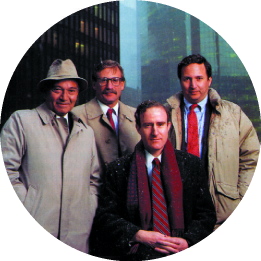 |
| From a March-April 1987 Harvard Magazine roundtable on the economy: Stanford's Ezra Solomon and Michael Boskin, Harvard's Benjamin Friedman and Lawrence Summers |
| Michael O'Neill |
In terms of scholarship and teaching, Summers raises two challenges: "how the University can best function in a world of such rapid scientific progress," and the issues involved in "adapting an institution with strong traditions to the new realities of globalization and technology." Finally, he is mindful of "the importance of the example Harvard sets, not just for itself but for higher education nationally and globally."
On management matters, Summers says, "It's very important that Harvard be a uni-versity, with emphasis on the prefix uni. It's very important that the different parts of Harvard work together in the best possible way." Before determining the structure he will use to foster that cooperation--and deciding whether he will continue Neil L. Rudenstine's innovations such as the provostship and a coordinating academic council of deans--Summers lays out several administrative principles. "An institution like Harvard necessarily runs as much--more--from the bottom up than from the top down," he says. "Great research can't be directed or channeled--it comes from great scholars given the tools they need." He thinks it "very important that students have a full voice in their education," and equally important for university leaders "to always be in touch with the universities' ultimate constituents"--faculty, students, staff, and alumni--"not just with their fellow administrators."
Richard Zeckhauser foresees an organization and a style "unlike the Bush White House, with its very corporate structure." Summers, he says, "will stand less on ceremony" and will build connections throughout the University in search of help and information. "He's a very forthright guy," says Jerry Green. "He asks a lot of questions. He likes to get to the bottom of things."
In the course of those inquiries, one observer says, he imagines exchanges where "If you say, 'Let's do X,' Summers tends to say, 'Why not Y?'"--putting a premium on thorough, speedy evaluation of alternatives, and direct, substantive presentations. In style, one administrator describes a distinct shift from the "humanistic gentility" of Harvard's past several presidents.
Long-time colleagues expect an energetic presidential presence. "Larry's going to have lots of ideas and shake up the place in all kinds of ways I know nothing about," says Gregory Mankiw. "I don't think he's going to sit on his hands." When discussion concludes, according to Zeckhauser, "He will say things Harvard should do that it isn't, and things it shouldn't do that it is."
Whatever those decisions turn out to be, several people who have worked closely with the president-elect--by profession, sober social scientists all--turn giddy at the prospect of his return to Harvard. Green, commenting on Summers's experiences in Washington and his institutional sense, says, "He's become very pragmatic, and he's come to understand the interplay between economics and politics in a way no economics professor can. He understands that better than anyone in the world."
Benjamin Friedman, assessing Summers as a prospective public spokesman, sees "the intelligence and self confidence and personality" to "make the case to the body politic about why this is the way to go" on higher-education issues. "More than anybody I know in the world, Larry is well suited and qualified--and I hope motivated--to play that role."
Cutler sounds the same theme on the "really hard issues" within Harvard: ownership of the content of a professor's course, say, or determining "what parts of the University should be near other things" as the future Allston campus is planned. "I have no idea what his views are," Cutler says, "but he's the one person in the world I'd want to decide. He'll think through those hard issues where you have no idea what to think."
For his part, Summers relishes doing "everything we can to recognize that Harvard's twin missions of training young people and producing new ideas are probably the most important missions for the future of our society and for the world." He anticipates "lots of thought and consultation" during the next few months to determine "just what the modes are" for his administration. In spare moments, if any, he will indulge in reading "bad fiction and good nonfiction," and, particularly, in playing tennis--a lifelong passion at which, he is fond of saying, "I play a lot better than you'd expect looking at me." (Note to Harvard's incoming athletics director: "As a graduate student, I used to play very late-night indoor tennis, but maybe in my new role I'll get access to better courts and better court times.")
Off the court, the economist is back in the academy again--not just with a professor's perspective, but with a vivid, expanded sense of the "enormous role for research universities in general, and Harvard in particular, to do things that are terribly important for the world, and that will not get done if we don't do them."





